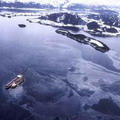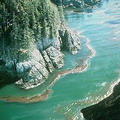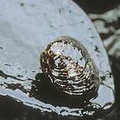 針對愛克森瓦拉茲(Exxon Valdez)號油輪在1989年的漏油污染災難,美國聯邦最高法院日前給了這起美國史上最嚴重漏油事件的受害者一個打擊,他們將要賠償給受害者的25億美元的懲罰性賠償金(punitive damages award)刪減為5.07億美元。最高法院根據海商法(maritime law),以5比3的意見差距,裁定這個對抗石油巨擘的懲罰性賠償金額過高。
針對愛克森瓦拉茲(Exxon Valdez)號油輪在1989年的漏油污染災難,美國聯邦最高法院日前給了這起美國史上最嚴重漏油事件的受害者一個打擊,他們將要賠償給受害者的25億美元的懲罰性賠償金(punitive damages award)刪減為5.07億美元。最高法院根據海商法(maritime law),以5比3的意見差距,裁定這個對抗石油巨擘的懲罰性賠償金額過高。
本身擁有艾克森石油公司股票的艾利托法官(Samuel Alito)主動要求迴避這個案子。
這個裁決結果結束了艾克森石油公司與受那場災難影響的3萬3000個民眾一個歷時久遠的法律戰爭。這群受影響的民眾包括職業漁民、罐頭工廠工人、阿拉斯加原住民及其他受災者。
瓦爾狄斯油輪在1989年3月24日剛過午夜時分猛烈地衝撞威廉王子海灣(Prince William Sound)的一處礁岩,溢出1100萬加侖(約4.164萬公噸)的原油,污染阿拉斯加大約1500英哩(約2414公里)的海岸線。
這些原告當時對艾克森石油公司提出一項團體訴訟,而一個阿拉斯加陪審團在1994年判給他們50億美元的懲罰性賠償金。
後來艾克森公司對那項判決提出上訴,而2006年12月聯邦上訴法院第九巡迴審判庭將賠償金額降到25億美元,即每位原告大約可得到7.5萬美元。
 這個石油巨擘又再次上訴,但是被第九巡迴審判庭駁回,他們再向最高法院提起上訴。這次6月25日的判決使目前每位仍活著的原告獲得大約1.5萬美元的賠償金,由之前較低階法院所判決的7.5萬美元向下修正。
這個石油巨擘又再次上訴,但是被第九巡迴審判庭駁回,他們再向最高法院提起上訴。這次6月25日的判決使目前每位仍活著的原告獲得大約1.5萬美元的賠償金,由之前較低階法院所判決的7.5萬美元向下修正。
高等法庭所審慎評估的重點大部分是與海商法有關的三個問題。第一個問題主要針對艾克森公司是否應該承擔因那艘船船長海叟伍德(Joseph Hazelwood)個人行為而被判的懲罰性賠償。
就在意外發生之前,海叟伍德已經設法將油輪駛離航道以躲避冰層,他於是讓其他船員決定何時將船轉回航道,這個決定違反了船公司的規定。
酗酒的海叟伍德也坦承在意外之前喝了酒。艾克森公司則提出爭議點,他們認為海叟伍德並不是他們公司的經營管理者(managerial agent),也就是說不能因為他的行為而讓他們公司來承擔懲罰性賠償責任。
高等法院對此問題的意見保持4比4票的拉距,因此決定維持較低階法院的判決來駁回艾克森公司的觀點。然而法官們卻全體一致地駁回艾克森公司的第二個爭論點,這個爭論內容是他們公司聲稱「清淨水源法案(Clean Water Act)」是在海事漏油案有關的懲罰性賠償規定之前成立的。
 法庭對於這兩個爭議的回應釐清了第三個問題的考量點,也就是25億美元的賠償金是否過多。
法庭對於這兩個爭議的回應釐清了第三個問題的考量點,也就是25億美元的賠償金是否過多。
意見紛歧的法庭於是決議這個案子的懲罰性賠償不應該超過艾克森公司已經支付的5.07億美元實際損失賠償(compensatory damages)。
The U.S. Supreme Court has dealt a blow to victims of the 1989 Exxon Valdez disaster, cutting the $2.5 billion in punitive damages award for the worst oil spill in U.S history to $507 million. The court, by a 5-3 margin, ruled the punitive damages awarded against the oil giant were excessive under maritime law.
Justice Samuel Alito, who owns Exxon stock, recused himself from the case.
The ruling brings to a close a long-running legal battle between Exxon and a group of 33,000 commercial fishermen, cannery workers, native Alaskans and others affected by the disaster.
The Valdez slammed into a reef in Prince William Sound just after midnight on March 24, 1989, spilling 11 million gallons and contaminating some 1,500 miles of Alaskan coastline.
The plaintiffs filed a class action suit against Exxon and in 1994 an Alaska jury awarded them $5 billion in punitive damages.
Exxon appealed the ruling. In December 2006 the Ninth Circuit Court of Appeals reduced the punitive damages to $2.5 billion, roughly $75,000 per individual plaintiff.
The oil giant appealed again, was denied by the Ninth Circuit and then appealed to the Supreme Court.
Today's ruling leaves each surviving plaintiff with about $15,000 each, down from the $75,000 each would have been awarded had the lower court's ruling been upheld.
The court's deliberations largely rested on three questions of maritime law. The first question centered on whether Exxon can be held liable for punitive damages for the actions of the ship's captain, Joseph Hazelwood.
Prior to the accident, Hazelwood had maneuvered the vessel out of the shipping lane to avoid ice. He subsequently left other crew members in charge with instructions on when to return the shipping lane - in violation of company rules.
Hazelwood, an alcoholic, also admitted to drinking alcohol prior to the accident. Exxon had argued that Hazelwood was not in effect a "managerial agent" of the company, meaning it could not be held liable for punitive damages stemming from his actions.
The Supreme Court remained divided 4-4 on this first question, thereby upholding the lower court's decision that rejected Exxon's view. The justices unanimously rejected Exxon's second argument - the company had claimed that the Clean Water Act preempted punitive damage awards in maritime spill cases.
These two answers cleared the way for consideration of the third question, whether the $2.5 billion award was excessive.
The divided court determined that punitive damages in the case should not exceed the $507 million Exxon has already paid in compensatory damages.
全文及圖片詳見:ENS






